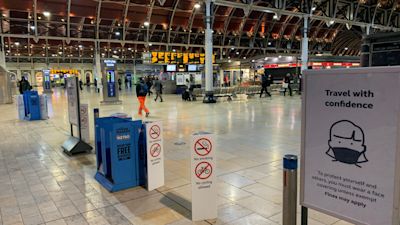Covid: Traffic and public transport use down as work from guidance reintroduced in England

ITV News Correspondent Ben Chapman reports on the impact tighter restrictions will have on Britain's city centres
Work from home guidance which came into effect today has had an immediate impact on traffic levels and the number of people using public transport across England, according to new statistics.
The government urged people to work from home where possible from Monday, under new Plan B curbs brought in amid rising concern over the rapid spread of the Omicron Covid variant.
Figures from location technology firm TomTom show cities across England experienced a decline in traffic on Monday morning.
Birmingham's traffic decreased from 87% to 55%, Bristol's from 60% to 41%, and Leeds from 74% to 43%.
TomTom's statistics also showed a fall in congestion levels in Leicester, which went from 98% to 51%, and Manchester, where levels decreased from 89% to 53%.
The figures represent the proportion of additional time required for journeys compared with free-flow conditions.
Trains were also affected. Network Rail said footfall at several major railway stations between 6am and 9.30am on Monday plummeted compared with the same period last week.
Cannon Street in the City of London saw the largest week-on-week decline out of the 16 stations it gave figures for, at 38%.
This was followed by Leeds Central (35%), Waterloo (34%) and King’s Cross (28%).
Other stations where a reduction in demand was recorded include Birmingham New Street (24%), Manchester Piccadilly (20%) and Edinburgh Waverley (11%).
Transport for London (TfL) recorded an 18% reduction in the number of London Underground journeys made between the start of service and 10am on Monday compared with the same period last week, while bus usage declined by 6%.
Tube use up to 10am was at 46% of pre-coronavirus levels, with demand for buses at 71%. TfL said passenger numbers after 10am are closer to those seen before the virus crisis began.
In London at 8am, congestion levels were down from 72% two weeks ago to 60%.
Some social media users commented that their commutes were much quieter on Monday. One Twitter user said: "Everywhere is extremely quiet again. Have school holidays started ? Or is everyone working from home."
She said there was "no one" at the bus stop, as well as "no traffic" and "no people walking".
From Monday, official advice states that office workers who can work from home should do so, although the instruction is not legally mandatory.
The devolved administrations in Scotland and Northern Ireland had already advised people to work from home.
The new guidance was revealed at a Downing Street press conference last week, where 'Plan B' Covid curbs were announced amid predictions the Omicron variant will become the dominant strain in the UK this week.
As part of the new measures, Boris Johnson said face masks would be a legal requirement in most public indoor areas - such as theatres and cinemas- and Covid passes will be required to get into nightclubs and other potentially crowded venues.
Referencing the working from home guidance specifically, the prime minister said: “I know this will be hard for many people but by reducing your contacts in the workplace, you will help slow transmission.”
Many businesses in city centres, however, fear the move will lead to a drop in customers in the run up to the crucial Christmas shopping period.
Others have expressed concern about the psychological impact of people being isolated away from their colleagues at home after nearly two years of restrictions.
The Plan B measures will be put to a commons vote on Tuesday.
In a televised address to the nation on Sunday, Mr Johnson announced that from Monday in England, the booster vaccine programme will be opened up to every adult over 18 who has had a second dose of the vaccine at least three months ago - the NHS booking system will be open to the younger age groups from Wednesday. In a stark warning, the prime minister told the nation “we must urgently reinforce our wall of vaccine protection”, as he set a new deadline of jabbing everyone over 18 by the new year by launching the "Omicron emergency booster national mission".
The Omicron variant has concerned scientists since its emergence in South Africa, and the UK has now recorded a total of 3,137 cases after a further 1,239 cases of the mutation were recorded on Sunday.
Listen to our coronavirus podcast for the latest analysis